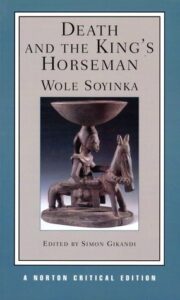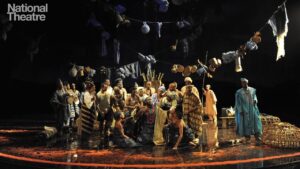The Wolf by Your Ears:
Evaluating Religious Freedoms in “Death and the King’s Horseman”
By Efe Bir

In his play “Death and the King’s Horseman,” Wole Soyinka constructs a setting that provides an excellent backdrop for testing various values, including freedom of religion. By incorporating a Yoruba suicide ritual in postcolonial Nigeria, he prompts readers to contemplate the limits of religious freedom and the preservation of diversity. Soyinka further expands the examination of freedom by introducing conflicts within and between two distinct cultures.
The play commences in the midst of the Yoruba people preparing for the ritual following their king’s death, which involves the suicide of his horseman, Elesin. According to Yoruba beliefs, if Elesin fails to carry out the suicide, the universe will cease to exist, and chaos will reign. However, upon learning about the ritual, the British colonial officers perceive it as unnecessary and primitive, deciding to intervene and arrest Elesin. The local community becomes furious at his arrest, fearing that the failure of the ritual will result in the end of the universe. This colonial setting presents a unique scenario for examining values, as the British view the ritual as uncivilized and inappropriate, while the Yoruba consider it the only option for the survival of all civilizations on Earth. Thus, the audience is indirectly prompted to question the extent to which respect and freedom of religious practice can function in a diverse society. The play tests the values of freedom by showcasing an extreme form of fundamentalism within an indigenous community, leaving the audience to anticipate the consequences of intervention and inhibition. Ultimately, the text conveys that any interference in the freedom of religious practice ultimately leads to greater harm. In the play’s conclusion, Elesin ends up taking his own life, which, for the religious leader, is insufficient as he was too late, and the colonial officers fail to completely halt the ritual. Both the Yoruba and the British officers ultimately experience defeat in their respective battles.
In conclusion, Wole Soyinka employs “Death and the King’s Horseman” as an extreme simulation, perhaps to encourage the audience to reconsider the boundaries of religious freedoms. However, Soyinka seems to hold the viewpoint that regardless of how extreme or foreign a practice may seem, any interference in fundamental practices can have more devastating consequences than allowing them to be performed. Naturally, Soyinka does not provide a definitive answer to the questions raised in the play. Nonetheless, the play serves as an exceptional example of how certain situations can illustrate the extent to which values can be stretched. In this case, a suicide ritual that serves as the sole assurance of the universe’s balance for the Yoruba people, while being deemed unacceptable and uncivilized by the European colonial officers.

